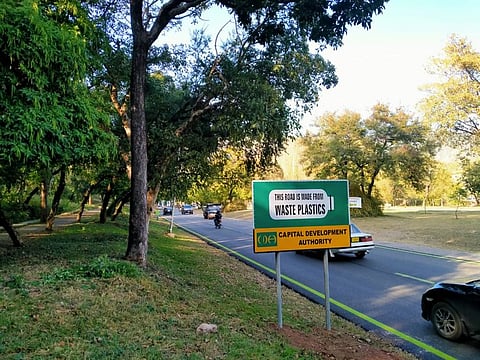Pakistan’s first plastic road made with 10-tonne bottles goes functional
1-km road paved with recycled plastic is 2-3 times more durable than ordinary road

Islamabad: Pakistan’s Minister for Interior Sheikh Rashid Ahmed on Monday inaugurated the first of its kind road in the country paved with plastic waste.
A large number of youngsters, particularly school kids participated in the launching ceremony.
They were holding placards with slogans to protect environment from plastic waste. The project, completed under public-private partnership (Capital Development Authority, Coca Cola and National Incubation Centre), aims to provide solution to the country’s hugely mismanaged plastic waste problem which is highest (in percentage) in South Asia.
“Pakistan produces 55b plastic bags annually”
In Pakistan, according to a report shared by the organisers on the occasion, around 55 billion plastic bags are produced in the country every year and most of these single-use non-biograded bags find their way to open garbage dumps, landfill sites or municipal sewers.
The new concept of a plastic road, which though is not new in many countries, will create a scalable solution for plastic to be used in high-value production, said an expert.
‘10 tonnes of plastic bottles utilised’
Fahad Ashraf, VP for Coca-Cola Pakistan and Afghanistan said; “This road belongs to all Pakistanis, and all the people who care about progress.
A global phenomenon.
The plastic road is a global good-practice and is said to last about twice as long as a normal road.
It will help protect the environment, but if scaled up to other roads in rural areas, urban centres and national highways, the impact to both development and environment will be large scale, not cosmetic.
Parvez Abbasi representing the strategic leadership of the National Incubation Center (NIC) said, “We now must ensure all partners who are for a better planet step in and support this public-private partnership by doing their part.”
Sign up for the Daily Briefing
Get the latest news and updates straight to your inbox







